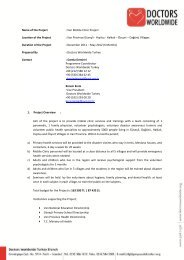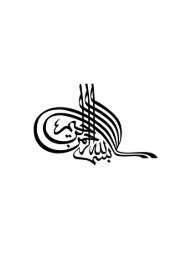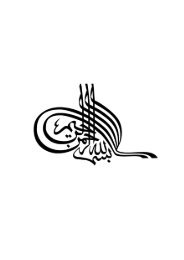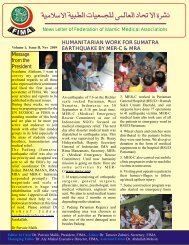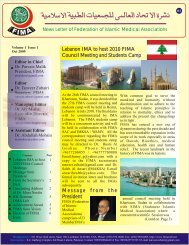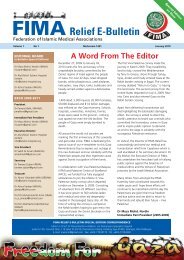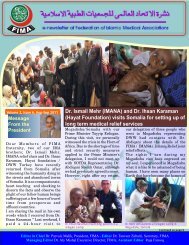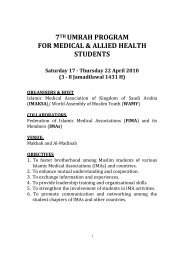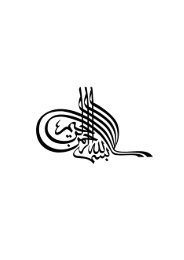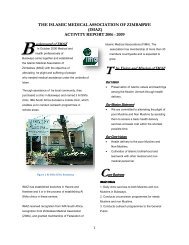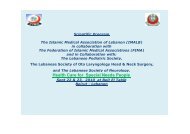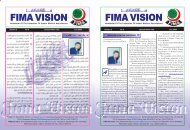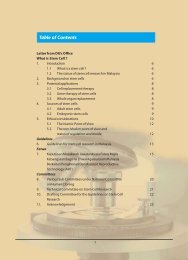FIMA Year Book 2009 - Federation of Islamic Medical Associations
FIMA Year Book 2009 - Federation of Islamic Medical Associations
FIMA Year Book 2009 - Federation of Islamic Medical Associations
You also want an ePaper? Increase the reach of your titles
YUMPU automatically turns print PDFs into web optimized ePapers that Google loves.
Ethical Issuesmake him a living example <strong>of</strong> all thathis Creator loves, free from all thatAllah hates, well saturated with the love<strong>of</strong> Almighty Allah, <strong>of</strong> people and <strong>of</strong>knowledge. (16)There is not a better way to translatethe theoretical aspects <strong>of</strong> medical ethicsthan to prepare an ethically motivateddoctor. <strong>Medical</strong> ethics is not an essentialpart <strong>of</strong> medical curricula <strong>of</strong> most <strong>of</strong>the universities and medical schools.The learning behaviors and modalities<strong>of</strong> imparting medical educationneed certain ethical boundaries.These ethical boundaries are verywell drawn by the <strong>Islamic</strong> educationsystem. In the framework <strong>of</strong> goodeducational methodologies, certainresponsibilities lie on the educationalsystem, curriculum, teachers,students, learning environmentand pedagogical methodologies.This list is never exhausted andneeds continuous upgradationand modification according to theemerging requirements. Teachingand training <strong>of</strong> medical students toupbring good Muslim doctors is theprime responsibility <strong>of</strong> all those whoare involved in medical educationprograms and their implementation.The knowledge and expertise whicha Muslim medical practitioner oracademician acquires is a bounty <strong>of</strong>Allah (SWT) and he/she will be askedabout all bounties bestowed to him/her. Imparting obsolete knowledge andtraining doctors through outmodedmethodology does not match thedemands <strong>of</strong> taqwa (God fearing).Achieving excellence in academia isthe prime responsibility <strong>of</strong> a Muslimmedical teacher. “The reward <strong>of</strong> everyexcellence is excellence” (17) Inferiorquality <strong>of</strong> medical training andeducation at under or postgraduatelevels is a deviation from <strong>Islamic</strong>teachings. In the history <strong>of</strong> Islam,Muslim medical teachers always kepttheir students with them during theirpractice hours. They used to learn andacquire the behaviors <strong>of</strong> their teachersand used to follow what they learndirectly from their teachers. At thesame time they were researchers andinnovators thus contributing directlyto the progress <strong>of</strong> medical knowledgeand expertise. Ethical dimensions <strong>of</strong>medical education commence rightfrom the time <strong>of</strong> selection <strong>of</strong> thestudents to train them as medicaldoctor or for post graduate residencyprograms.The selection criteria in <strong>Medical</strong>SchoolThe selection and training <strong>of</strong> medicalstudents should emphasize serviceswithin the <strong>Islamic</strong> system <strong>of</strong> mutualsocial support. During the selectionprocess the main emphasis shouldbe that we are selecting leaders <strong>of</strong>the future, whose moral values andattitudes should be a role model for thesociety. A medical institution shouldaim to train physicians who must beable to conduct research to extend thefrontiers <strong>of</strong> knowledge. The process<strong>of</strong> training at undergraduate and postgraduate levels must motivate the<strong>FIMA</strong> <strong>Year</strong><strong>Book</strong> <strong>2009</strong>87




